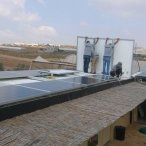
28 de julio de 2015 | Informes especiales | Justicia climática y energía
Palestine: Renewable energy
We Are the Energy Revolution
Abeer Al Butmeh, Jordan Valley, Palestine: "In the Jordan Valley area there is no electricity, but electricity is necessary for people to live there. But we aim to help the families to stay on their land. 26 Solar units have been supplied to 26 families"
We are an environmental NGO network of 17 environmental organisations in Palestine.
What is the history of PENGON?
Since 2003, PENGON members have worked on new initiatives in the renewable energy field. In the first phase of the projects the organisations are responsible for the management process, then the local council operates it after a capacity building program.
How has the situation changed?
For the last five years, PENGON and its members have been active in building initiatives for renewable energy. These activities were initiated because of an urgent need to find a sustainable solution for the marginalized communities who suffer from energy scarcity especially in Area C ( under full Israeli civil and security control).
The scope of these initiatives is to promote sustainable eco-solutions. These interventions have a great impact on socioeconomic and environmental conditions in communities in Palestine.
How are your projects particularly suitable for the local communities’ needs?
PENGON interacts with communities through branches in cities in Gaza and the West Bank. We have relationships with local authorities and development councils.
We also formed an environmental committee for people to contact for urgent environmental needs and problems. We meet regularly and work on projects where communities are affected.
We work with the most marginalised communities. Those villages who have water resources, we utilize and pump water by using renewable energy (solar mainly). For poor families (especially in Gaza) who suffer from a lack of fuel to operate electrical generators, we work on finding alternatives to supply them with energy. We help Bedouin communities in the Jordan valley, who are prevented from implementing any infrastructural project because of Israeli restrictions, to access what they need.
Who are the major players involved?
Marginalized communities, villages, poor families with lack of fuel. Governmental organizations that work in the field, village councils, and donors.
What is the current situation with your projects?
1. Jordan Valley – Solar Project implemented by Maan Development Center (a PENGON member)
In the Jordan Valley area there is no electricity, but electricity is necessary for people to live there. Israeli restrictions create problems - there are restrictions preventing communities from building infrastructure projects, even water tanks. But we aim to help the families to stay on their land.
26 Solar units have been supplied to 26 families. The families living here are Bedouin communities – they are marginalised. They own sheep and depend on cheese production to live. So they use these units to power refrigerators so that they can sell their cheese. It’s too hot without the refrigerators – it’s not possible to save the cheese products without them. Without this energy the Bedouin could not bring any income – they would be forced to leave their land.
2. Gaza – Energy Access Project implemented by Palestinian Hydrology Group (a PENGON member)
Because of the Israeli siege there is only a small amount of fuel entering Gaza. There is a real shortage of fuel and some communities only have 3 or 4 hours of electricity a day in their houses. They also have a problem pumping waste water and operating waste water treatment plants.
Solar panels have been supplied, not only to provide electricity for families but also to operate the waste water plants. Without the energy there would really be an environmental catastrophe.
What are the key barriers you face?
Apart from financial - the risk in Gaza is that, since the siege, we have a problem with spare parts entering Gaza; not only spare parts for renewable energy but also water pumps and pipes – all infrastructure project materials.
Just like in the Jordan Valley, our problem is often supplying water tanks. In a village near Bethlehem City, we had a case where a PENGON member implemented a full solar energy system in their village. It was near an Israeli settlement. The Israelis destroyed it.
What were the major enabling factors that allowed your project to get up and running?
Our projects are financed by grants from donors. Our allies – governmental organisations, village councils, and our expertise in the field.
What is your vision for the future?
In general, the solution in Gaza is to work towards a focus on renewable energy. Gaza has the sea – we can use energy from the sea, and from solar.
Do you have a view on the links between your struggle and climate change?
The priority for PENGON is energy access. Palestine is not a big actor in climate change – the country needs to adapt to climate change. The real focus is on lobbying for renewables because people have a right to energy.
By We Are the Energy Revolution
Imagen: We Are The Energy Revolution








